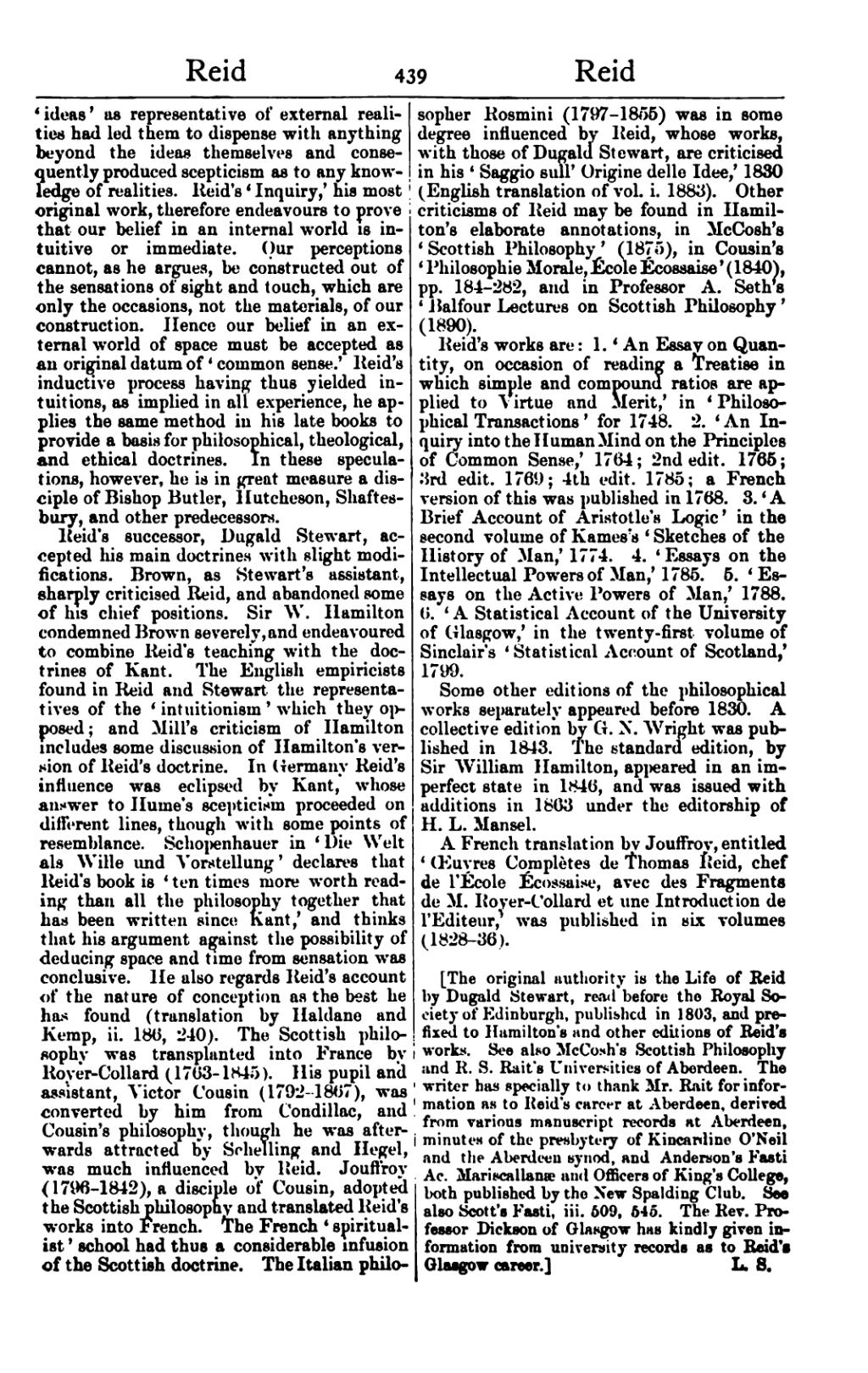‘ideas’ as representative of external realities had led them to dispense with anything beyond the ideas themselves and consequently produced scepticism as to any knowledge of realities. Reid's ‘Inquiry,’ his most original work, therefore endeavours to prove that our belief in an external world is intuitive or immediate. Our perceptions cannot, as he argues, be constructed out of the sensations of sight and touch, which are only the occasions, not the materials, of our construction. Hence our belief in an external world of space must be accepted as an original datum of ‘common sense.’ Reid's inductive process having thus yielded intuitions, as implied in all experience, he applies the same method in his late books to provide a basis for philosophical, theological, and ethical doctrines. In these speculations, however, he is in great measure a disciple of Bishop Butler, Hutcheson, Shaftesbury, and other predecessors.
Reid's successor, Dugald Stewart, accepted his main doctrines with slight modifications. Brown, as Stewart's assistant, sharply criticised Reid, and abandoned some of his chief positions. Sir W. Hamilton condemned Brown severely, and endeavoured to combine Reid's teaching with the doctrines of Kant. The English empiricists found in Reid and Stewart the representatives of the ‘intuitionism’ which they opposed; and Mill's criticism of Hamilton includes some discussion of Hamilton's version of Reid's doctrine. In Germany Reid's influence was eclipsed by Kant, whose answer to Hume's scepticism proceeded on different lines, though with some points of resemblance. Schopenhauer in ‘Die Welt als Wille und Vorstellung’ declares that Reid's book is ‘ten times more worth reading than all the philosophy together that has been written since Kant,’ and thinks that his argument against the possibility of deducing space and time from sensation was conclusive. He also regards Reid's account of the nature of conception as the best he has found (translation by Haldane and Kemp, ii. 186, 240). The Scottish philosophy was transplanted into France by Royer-Collard (1763–1845). His pupil and assistant, Victor Cousin (1792–1867), was converted by him from Condillac, and Cousin's philosophy, though he was afterwards attracted by Schelling and Hegel, was much influenced by Reid. Jouffroy (1796–1842), a disciple of Cousin, adopted the Scottish philosophy and translated Reid's works into French. The French ‘spiritualist’ school had thus a considerable infusion of the Scottish doctrine. The Italian philosopher Rosmini (1797–1855) was in some degree influenced by Reid, whose works, with those of Dugald Stewart, are criticised in his ‘Saggio sull' Origine delle Idee,’ 1830 (English translation of vol. i. 1883). Other criticisms of Reid may be found in Hamilton's elaborate annotations, in McCosh's ‘Scottish Philosophy’ (1875), in Cousin's ‘Philosophie Morale, École Écossaise’ (1840), pp. 184–282, and in Professor A. Seth's ‘Balfour Lectures on Scottish Philosophy’ (1890).
Reid's works are: 1. ‘An Essay on Quantity, on occasion of reading a Treatise in which simple and compound ratios are applied to Virtue and Merit,’ in ‘Philosophical Transactions’ for 1748. 2. ‘An Inquiry into the Human Mind on the Principles of Common Sense,’ 1764; 2nd edit. 1765; 3rd edit. 1769; 4th edit. 1785; a French version of this was published in 1768. 3. ‘A Brief Account of Aristotle's Logic’ in the second volume of Kames's ‘Sketches of the History of Man,’ 1774. 4. ‘Essays on the Intellectual Powers of Man,’ 1785. 5. ‘Essays on the Active Powers of Man,’ 1788. 6. ‘A Statistical Account of the University of Glasgow,’ in the twenty-first volume of Sinclair's ‘Statistical Account of Scotland,’ 1799.
Some other editions of the philosophical works separately appeared before 1830. A collective edition by G. N. Wright was published in 1843. The standard edition, by Sir William Hamilton, appeared in an imperfect state in 1846, and was issued with additions in 1863 under the editorship of H. L. Mansel.
A French translation by Jouffroy, entitled ‘Œuvres Complètes de Thomas Reid, chef de l'École Écossaise, avec des Fragments de M. Royer-Collard et une Introduction de l'Editeur,’ was published in six volumes (1828–36).
[The original authority is the Life of Reid by Dugald Stewart, read before the Royal Society of Edinburgh, published in 1803, and prefixed to Hamilton's and other editions of Reid's works. See also McCosh's Scottish Philosophy and R. S. Rait's Universities of Aberdeen. The writer has specially to thank Mr. Rait for information as to Reid's career at Aberdeen, derived from various manuscript records at Aberdeen, minutes of the presbytery of Kincardine O'Neil and the Aberdeen synod, and Anderson's Fasti Ac. Mariscallanæ and Officers of King's College, both published by the New Spalding Club. See also Scott's Fasti, iii. 509, 545. The Rev. Professor Dickson of Glasgow has kindly given information from university records as to Reid's Glasgow career.]

